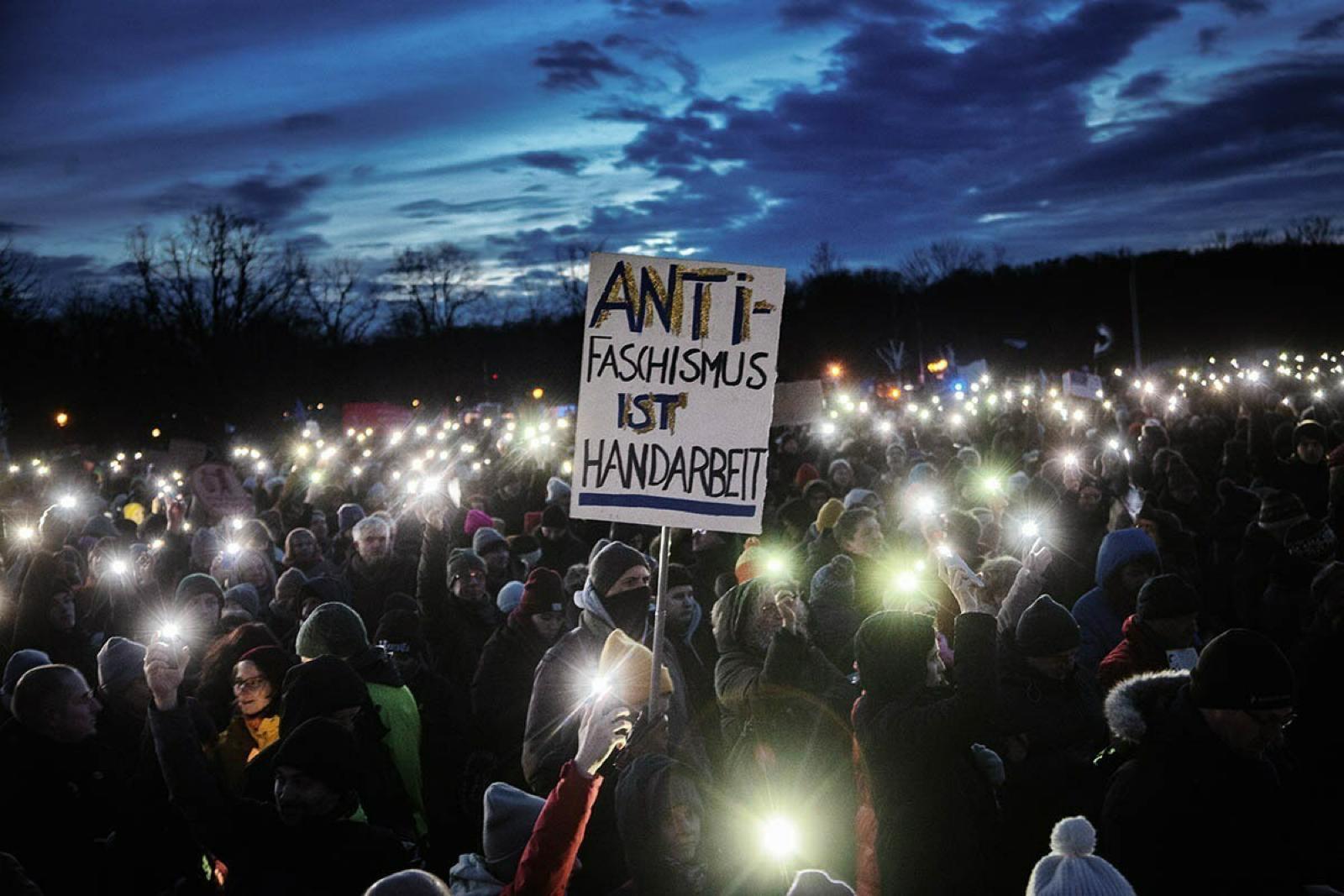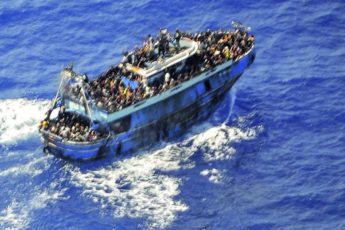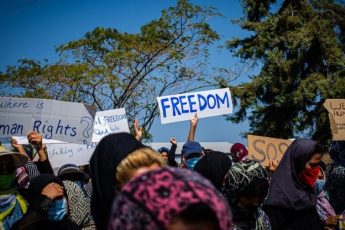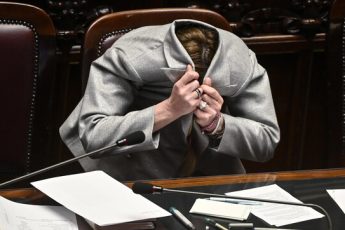
by HANNAH and SUZANNE (Interventionistische Linke, Berlin)
Since mid-January, hundreds of thousands of people have taken to the streets across Germany every weekend to protest against the far-right Alternative für Deutschland (AfD) party. In terms of numbers, these are some of the largest anti-fascist protests ever seen in the history of the Federal Republic of Germany. They were sparked by an investigation published on 10 January by Correctiv’s journalists, who reported on a secret meeting of the new right in Potsdam, the capital of the state of Brandenburg, which surrounds Berlin. High-ranking AfD politicians, neo-Nazis, two politicians from the conservative CDU and financially strong entrepreneurs met here in late 2023 to plan the systematic expulsion of several million people from Germany under the heading of “remigration”. The AfD does not yet have the power to put these plans into practice. Nevertheless, the research impressively shows the fascist deportation policies that the AfD is preparing for a right-wing government.
Since then, a lot has happened on the streets: civil society alliances are organizing demonstrations against the far right not only in the capital, but in all kinds of cities, large and small, in western and eastern Germany. Numerous initiatives are gathering under the calls and even government representatives are coming to the demonstrations. The Correctiv investigation seems to have opened many people’s eyes to how real the fascist threat is. In some East German cities, it is the first time in years that anti-fascists rather than corona deniers or anti-migration activists are dominating the public space.
A new emerging anti-fascist movement in Germany?
Is this the hoped-for awakening that the left has been waiting for so long? Yes and no. The protests are an important symbol and a sign that many want to resist the shift to the right. At the same time, we view the demonstrations with a certain degree of skepticism, as the protests remain diffuse in their criticism. Moreover, migrant and refugee voices have repeatedly stated that they do not see their place at these demonstrations – not least because they know how real and commonplace racism is in Germany, and not just since Correctiv’s research.
In this text we discuss the alienation between the current demos and sections of the diasporic and (post-)migrant left and point out the gaps that we identify in the current discourse about the emerging movement against fascism.
Our thesis is that this alienation has a lot to do with two gaps in the protests: Firstly, the lack of engagement of the demos with the war in Israel/Palestine. And secondly, the too lax criticism of the already dominant deportation policies of the current government (a coalition between the Social Democrats (SPD), the neoliberal party (FDP) and the Green party.
The German reason of state and the war in Gaza
Today more than ever before, the question of alienation within the left can be answered by the fact that many groups that organize the demonstrations against the AfD are afraid to take an explicit position on the war in Gaza and Israel’s actions. Numerous alliances (especially within the radical left) that could have gained considerable momentum have collapsed in recent years over the question of how to classify the events between the Mediterranean and the Jordan River since 1948.
Even our own organization, the Interventionist Left (iL) Berlin, has not dealt with this question for a very long time. Since the 1990s, the German (radical but also liberal) left has split so often, not least over the Israel/Palestine conflict, that the iL has tried to avoid this question in order to remain capable of action. In the end, we had to realize that this tactic maneuvered us into an unproductive paralysis – we remained silent on the violence in Israel and Palestine and unable to act in the (admittedly mostly very unproductive) conflicts within our alliances. Fortunately, this is currently changing. Furthermore, in the German context, this issue is one of the most sensitive political questions within the radical left, and we would say rightly so.
Anti-Semitism is not just a threat to Jews in Germany not only since 7 October – and in most cases anti-Semitic violence is caused by right-wing extremists. The 2019 attack on the synagogue in Halle shows how little Jewish life is protected in Germany. We also believe that the phenomenon of anti-Semitism is not sufficiently addressed within the framework of an internationalist, anti-imperialist left, and that we need to create spaces where criticism of anti-Semitism is not equated with blind solidarity with Israel. Particularly since 7 October, Jewish comrades in Germany and Israel have reported a sense of disappointment and loneliness arising from the fact that Jewish suffering is barely acknowledged by some and instrumentalized by others.
But Jewish comrades are not the only ones who feel lonely and disappointed by the majority white German left (we use this term for lack of a better one and are aware of the problematic nature of this simplification). Palestinian voices, which carry with them a decades-long history of criminalization and invisibilization, have experienced an unprecedented level of repression since 7 October: many have lost their jobs for criticising German policies, Palestinian demonstrations were forbidden and there have been debates about banning the kufiyah in schoolyards. Palestinian mourning, identity and demands have no place in mainstream German public discourse.
Pro-Palestinian actors have been cancelled to an absurd extent in the name of the German culture of remembrance and so-called reason of state (Staatsräson). This is justified by Israel’s security and a blind equation of anti-Zionism with anti-Semitism. For example, presenters (very often non-white people) have been dismissed by public broadcasters for expressing solidarity with Palestinians and their struggle. State funding for a migrant venue, the Oyoun, in Berlin Neukölln, is being cut because the staff call for a free Palestine. In the name of anti-Semitism, a conservative backlash is orchestrated, using the suffering caused by the occupation, the Hamas attack and the war in Gaza to deprive the so-called post-colonial scene of spaces, resources and freedom of expression.
But it is not only the state that sanctions Palestinians and their allies. Sections of the left also meet the pro-Palestinian spectrum with suspicion, defensiveness and homogenising condemnation, which sometimes can only be described as racist. Instead of seeking alliances with the progressive parts of the movement and engaging in a critical exchange based on solidarity, most of the German left is either defensive or silent.
Both the German state and the German left want to be diverse and ‘colourful’, they see themselves as democratic and pluralist, but certain issues are not allowed to break away from the German Staatsräson.
Let us return to the initial question: Why do many racialized and migrant comrades often feel unrepresented by the protests? We think this has a lot to do with the war in Gaza. Many people have the justified impression that the German reason of state is taking to the streets in an anti-fascist guise. Standing hand in hand (the name of a large alliance in Berlin) around the Bundestag and defending – what? Also the German government’s unconditional support for the Israeli war and its prevention of a ceasefire in Gaza?
At the same time, the discourse within the radical left on Palestine/Israel seems to us to be partly charged with identitarianism, also in relation to the anti-fascist demonstrations: some pro-Palestinian actors demand unconditional solidarity, especially from predominantly white left-wing groups. In some cases, we are confronted with an uncomplex discursive insertion of migrant = pro-Palestinian. We do not believe that a statement against the AfD that does not explicitly address the situation in Gaza automatically defends the status quo in Palestine and Israel or Germany’s policy in the Middle East war. As radical leftists we should not act out of a moral reflex but in critical solidarity with each other – we should be sincere in our solidarity and honest in our criticism (even daring to criticize oppressed communities).
Since the horrific Hamas massacres and the terrible war in Gaza, many in the German left, especially Jews and Palestinians, have experienced alienation, lack of empathy and silencing. It is the responsibility of the left to address these divisions. And it is even more necessary if we are to stand hand in hand against the fascist danger.
The German government’s racist migration policy
Like Palestinians, many refugees rightly feel that their lives are worth less than those of white Europeans within the German state. Most anti-AfD demonstrations are still the project of a left-liberal, largely bourgeois civil society that feels reminded of the time when the Nationalsozialistische Deutsche Arbeiterpartei (NSDAP) came to power in the 1930s. For this reason, one of the slogans of the protests is “Never again is now” refering to the slogan “Never again” associated with the lessons of the Holocaust. The slogan was used by liberated prisoners of the Buchenwald concentration camp to express anti-fascist sentiments. Many Germans today are rightly put off by the term Deportation (the German word for describing the deportation to concentration camps by the nazis) which is not the same as Abschiebung (translation: expulsion; the same word as deportation in English but not used in the context of National Socialism).
It is impoertant to note that the AfD’s ethnic project is fundamentally different from the prevailing neoliberal migration policies of the current government. Nevertheless, it is central to emphasize that the government of Social Democrats, Greens and Liberals is pursuing racist policies even without the AfD in charge. Our comrades from the iL Frankfurt have analyzed the situation as follows: “Anti-fascists Everywhere, Freedom of Movement Nowhere”. And so both the German chancellor Olaf Scholz (SPD) and the German foreign minister Annalena Baerbock (Greens) joined the big anti-fascist demonstrations in Potsdam, the constituency of many high-ranking members of the government. Both have been actively involved in pushing through the CEAS reform in the EU, which is tantamount to the de facto abolition of the right to asylum.
The German Minister of the Interior, Nancy Faeser (SPD), also welcomes the protests against the far right and emphasizes that right-wing extremism remains the “greatest threat to our democracy”. This is the same minister who presented the ‘Repatriation Improvement Act’ passed by parliament in January. This law makes it easier to deport people by undermining their fundamental rights and creating the legal basis for detaining them for up to a month in preparation for their forced departure.
It is a problem that leading politicians who, shortly after the massacres of 7 October, spoke of “finally deporting on a grand scale” (quote Olaf Scholz), are not being booed at the current anti-fascist demonstrations. On the contrary, the fact that they can present themselves as the real democrats in the context of the AfD, shows that the protests have so far spoken out against right-wing extremism and in favor of democracy, but do not endanger the brutal status quo of the German and European border regime and ‘legal’ deportations.
In this context, the ugly face of the myth of ‘imported’ anti-Semitism is revealed once again. A narrative echoed by many, from the Social Democrats to the AfD, that assumes that Arab and Muslim migrants are particularly antisemitic. This narrative must, of course, be decisively rejected. Firstly, it does not correspond to the facts: Yes, there is also anti-Semitism among Muslims. But the vast majority of anti-Semitic crimes in Germany are committed by right-wing extremists. Secondly, it serves as a German defense against guilt. The anti-Semitism of the white German population is being denied, and the problem is externalized onto ‘the other’. Thirdly, the false narrative of imported anti-Semitism is regularly used as a justification for calling for further, tougher deportation offensives.
Hand in hand – but how?
In the face of rising right-wing extremism, racist government policies and divisions not only within the left but also between the left and migrants, we ask ourselves, how we can reunite our struggles. How is it possible to create a protest that is directed against the AfD and ethnic-fascist politics without remaining silent about the war in Gaza while showing empathy for Jewish victims and comrades? How can we as radical leftist intervene to turn the anti-fascist protests into anti-racist and anti-imperialist protests? Whether a sustainable social force will emerge from the remains to be seen. If we want to succeed in asserting a left-wing interpretation here, we have to create a common horizon across different issues and struggles.
We must clearly condemn the war in Gaza, name the blatant injustice that Palestinians have suffered since the founding of the state of Israel and position ourselves more strongly. Conversely, a position that does not see Israelis as civilians, a position that does not recognize the suffering caused by the Hamas massacre as such or even understand it as emancipatory, is no basis for political cooperation. All those who wish to do so, must have the right to live in freedom and equality in the region between the Jordan River and the Mediterranean Sea.
Recognizing that the fight against the AfD and fascism cannot take place independently of the war in Gaza is a first step if we want to organize a broad left-wing protest in which (post-)migrants, Jews, Palestinians, and white Germans stand side by side. Fighting Racism and Anti-Semitism within the extreme right and parts of the German majority society.
It is also clear that the fight against the ongoing tightening of asylum laws at the European and German level must be led jointly by refugees and white supporters. This requires spaces for exchange that go beyond moralizing discourses and address the different ways in which people are affected by the European border regime without coming to a standstill because of this injustice. Solidarity and compassion with those who are oppressed and murdered must be the guiding principle. Let’s work to continue to build these spaces and broaden our horizons.





